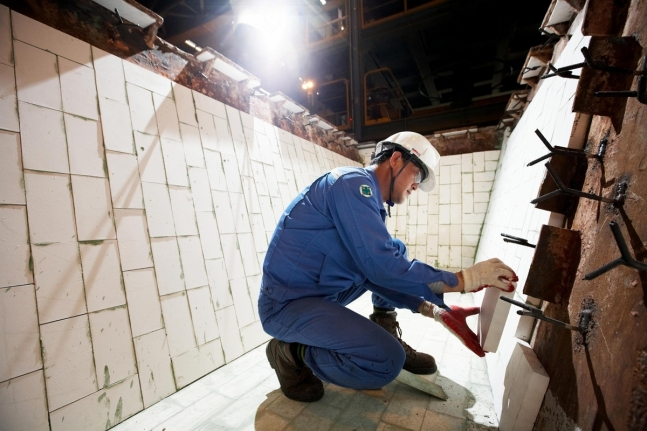Carbon neutrality
POSCO FutureM cuts carbon by recycling waste refractories
The firm recycles 100% of waste refractories from steel mill refurbishment, reducing its annual CO2 emissions by 30,000 tons
By Oct 16, 2023 (Gmt+09:00)
1
Min read
Most Read
LG Chem to sell water filter business to Glenwood PE for $692 million


KT&G eyes overseas M&A after rejecting activist fund's offer


Kyobo Life poised to buy Japan’s SBI Group-owned savings bank


StockX in merger talks with Naver’s online reseller Kream


Meritz backs half of ex-manager’s $210 mn hedge fund



Primarily extracted from seawater magnesia and shaped similarly to bricks, refractories are known for their fire-resistance. In steel manufacturing, they are strategically positioned inside blast furnaces and converters, essential in safeguarding equipment from the intense heat of molten iron.
Previously, during maintenance, these refractories were mostly sent to landfills. However, in a bid to promote resource sustainability and cut carbon emissions, the company ramped up its recycling efforts. The recycling rate witnessed a sharp increase, surging from 40% in 2020 to a full 100% in the following year.
This recycling strategy enabled the firm to process 17,000 tons of waste refractories last year, translating to a saving of 1.4 billion won. Moreover, it led to a reduction in carbon emissions by 30,000 tons annually, an environmental impact akin to planting nearly 3.75 million trees.
The company has diversified the use of these recycled refractories, incorporating them as raw materials in cement production, foundry sand, and even as covering for landfills.
Boasting ingredients beneficial for cement production like silica and alumina, the waste refractories have garnered attention. Strengthening this initiative, POSCO Future M. entered into a resource circulation ESG Partnership MOU in 2021, aligning with domestic cement producers for the supply.
Beyond cement, the heat-resistant properties of these refractories make them suitable for foundry sand, utilized in melting metals and molding. They also play a pivotal role in covering waste dumps, preventing dust and minimizing unpleasant odors.
Write to Hyung-Kyu Kim at khk@hankyung.com
More to Read
-

-
 BatteriesPOSCO Future M to produce nickel for cathodes in the Philippines
BatteriesPOSCO Future M to produce nickel for cathodes in the PhilippinesAug 18, 2023 (Gmt+09:00)
1 Min read -
 BatteriesPOSCO Future M spurs single-crystal cathode production
BatteriesPOSCO Future M spurs single-crystal cathode productionJul 23, 2023 (Gmt+09:00)
3 Min read -
 Carbon neutralityPOSCO Future M cut greenhouse gases 8.6% in 2022
Carbon neutralityPOSCO Future M cut greenhouse gases 8.6% in 2022Jun 19, 2023 (Gmt+09:00)
1 Min read
Comment 0
LOG IN


